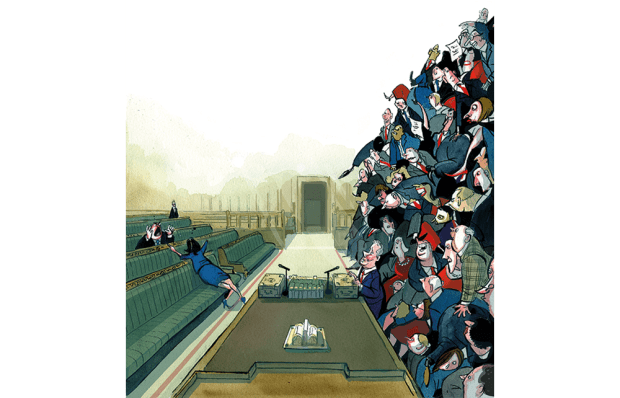A negotiated end
Sir: Owen Matthews’s piece hinted at the likely outcome of the Ukraine conflict, but his conclusion was too pessimistic (‘Spring loaded’, 4 February). It seems probable that the war in Ukraine will drag on without a decisive conclusion and that there will not only be disagreement among Nato members about supplying further arms, but that other governments will get tired of it. The only way to stop it will, therefore, be by negotiation. Given that the most successful negotiated settlements end with all sides being reasonably satisfied with the outcome, Russia, Ukraine, Nato and the EU will have to make compromises. Ukraine will have to agree to cede Crimea, and the Donbas too. This will be a tough sell for Zelensky, but one that would be made politically easier by Ukraine being accepted into the EU and Nato on an accelerated programme.
The advantage to Ukraine is obvious. A treaty that defined the border between Ukraine and Russia would, at the very least, deter further Russian incursions, assuming that even Putin would not wish to take on Nato. Nato would secure its eastern border, and be able to reduce defence expenditure. For the EU the benefit would be a vast country as a new member with an educated and entrepreneurial population, replete with resources. European business would have a great new market to replace sanctioned Russia. What’s not to like? I wouldn’t wish to be a member of the team having to negotiate all that; but nonetheless it would be well worth the effort.
Mark St Giles
West Lydford, Somerset
Community banks
Sir: Martin Vander Weyer is, as usual, right when he states that ‘every town still needs at least one high-street bank’ (Any other business, 4 February). In Australia one way is found through the Bendigo community banks, funded by local shareholders like my husband and me when we lived in the Windsor suburb of Melbourne. Our community bank serves the non-fashionable end of that city’s Chapel Street. Dividends have been infrequent and tiny but the community’s businesses and locals have a bank while its schools and other charities get most of the profits.
Dr Alan Rodger
Glasgow
Colonial blessings
Sir: How refreshing to have such a frank discourse on the successes and failure of British imperial rule (‘Empire state of mind’, 4 February). However, there was some stuttering when it came to the economic argument with its focus on the extraction of natural resources and inadequate reward to colonies. But this is to neglect the prior stage of such ‘exploitation’, the investment of capital required to enable the extraction. The point is well made in Kartar Lalvani’s The Making of India: the Untold Story of British Enterprise, with its account of British-built railways, ports and roads. Nor was the supply of water, education and health neglected. All of which led a former Indian cabinet minister to reflect on the permanent blessings of colonial rule, ‘which only the unique attributes of the British could have conferred on us’.
David Starkie
London SW8
Greyhound lobby
Sir: Neil Clark’s excellent article celebrates greyhound racing – still a thriving sport in England yet threatened in Scotland and Wales (‘Dog days’, 4 February). Up here, the American animal rights activist group Grey2k USA is publicly funding the campaign being run by Edinburgh lobbyists MessageMatters to get greyhound racing banned. The irony is spectacular – on the one hand the SNP/Green Administration don’t want Westminster or southerners to ‘interfere’ in Scottish affairs. Yet they are happy to be lobbied by the Yankee dollar and have US activists buying the opportunity to influence Scottish opinion.
Ben Raisbeck
Ballater, Aberdeenshire
The meaning of tonnage
Sir: R.W. Johnson, reviewing Spying on the Reich (Books, 28 January), somewhat impolitely accuses its author, R.T. Howard, of a schoolboy howler for referring to ships by their ‘weight’. Johnson admonishes that ‘tonnage is a measure of displacement, not weight’. However, as any well-informed schoolboy could tell him, the tonnage of water displaced by a floating ship is in fact identical to the weight of the ship itself (Archimedes’ principle) – so it is perfectly reasonable for the author to refer to ships by their weight. R.W. Johnson, back to school!
Peter Lammer
Oxfordshire
Snowdrop sightings
Sir: My enthusiasm for venturing out into this cold February was raised by Ursula Buchan’s tips on where to find the finest snowdrops (Notes on snowdrops, 4 February). Sadly my enthusiasm was short-lived, as one of the venues she lists where ‘galanthophilia is positively encouraged’ has become less positive. Hodsock Priory is no longer open for its hitherto traditional snowdrop event. Perhaps the article might encourage them to review this policy. I shall wait a few weeks and enjoy my narcissism at Felley Priory, one of Nottinghamshire’s finest venues for spring flowers.
Peter Clarke
Mansfield, Nottinghamshire
Listen up all y’all
Sir: Melissa Kite bemoans the use of the pronouns They and Them when referring to one person, and the confusion this may cause (Real life, 4 February). Might I recommend following the Texan approach? To specify that the second person pronoun Y’all is plural rather than singular, it is modified to All y’all.
Christopher Cox
Taynuilt, Argyll
Got something to add? Join the discussion and comment below.
Get 10 issues for just $10
Subscribe to The Spectator Australia today for the next 10 magazine issues, plus full online access, for just $10.
You might disagree with half of it, but you’ll enjoy reading all of it. Try your first month for free, then just $2 a week for the remainder of your first year.














Comments
Don't miss out
Join the conversation with other Spectator Australia readers. Subscribe to leave a comment.
SUBSCRIBEAlready a subscriber? Log in